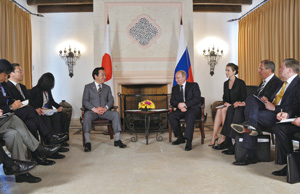Putin Adopts a Balance of Power Policy
—–Russia’s movements are also part of multipolarization.
If we look at international politics from this big picture, since Putin became president in 2000, the adoption of a national strategy that counterbalances America’s unipolarization strategy and promotes multipolarization of the international structure, and one whereby Russia restores once again the sphere of influence lost in the Gorbachev and Yeltsin administrations, is a natural countermeasure. Those with even a little knowledge of 17th-19th century Russian diplomatic history would agree that Putin’s diplomatic strategy is the same as the typical Russian diplomatic strategy that has continued for the past 400 years.
Strategist Kennan, who is fluent in Russian, says, “The Russians’ top priority in international politics is the expansion of power, both military and political. The concept of collective security that Western countries advocate is nothing more than a naive joke to Russians.” He adds that the Russians are always thinking about how they can expand their nation’s sphere of influence. I am also convinced that Russia counterbalances America’s global strategy with China as its strategic partner, and has started reinforcing military facilities on the four northern islands.

The Japan-Russia summit meeting in Mexico on June 18. Japan-Russia relations will not improve unless Japan becomes a player in balance of power diplomacy. Photos: Aleksey, Nikolskyi, RIA Novosti, Reuters, Aflo.
—–Will it be difficult for Japan-Russia relations to improve?
No, it is possible. All it will take is Russia to create a situation whereby it can judge that the cooperation of both it and Japan will be a favorable condition for its balance of power strategy.
In ten years time, Russia will think that China’s military and economic strength has become too great, and that its Asian diplomacy needs a partner to counterbalance China’s supremacy. Then if Japan were to become a nation with an autonomous national defense that provided an independent nuclear deterrent force, Russia would consider it a player in the balance of power game, and would embark on foreign policy that attached great importance to Japan.
However, Japan has reduced its defense budget each year for the last ten years, so if it were unable to take countermeasures against North Korea’s increased production of nuclear weapons, Russia would have nothing at all to do with Japan.
Richard Solomon, who was the assistant secretary of state for the U.S. Department of State (in charge of East Asian policy), stated that today’s Japan was not considered a “player in international politics” (bitter laugh). There is no reason why Russia would want to seriously cooperate with a Japan that was so apathetic and lacked a strategic outlook.
Over the next few decades, the nuclear-armed nations of China, North Korea, and Russia will continue with diplomatic behavior that treats Japan harshly. The four northern islands will never be returned to Japan, and the Senkaku Islands will be taken by China. It is a natural fate for a country that makes no attempt to have an autonomous deterrent force.
Related
- President Putin and the Future of Russia─An Interview with the Guardian Spirit of Vladimir Putin─
President Putin is highly regarded for his performance. He revived a “strong Russia,” by managing to subdue the economic and political turmoil, and by increasing the GDP growth by five times during his previous presidential term that continued for 8 years. …


















